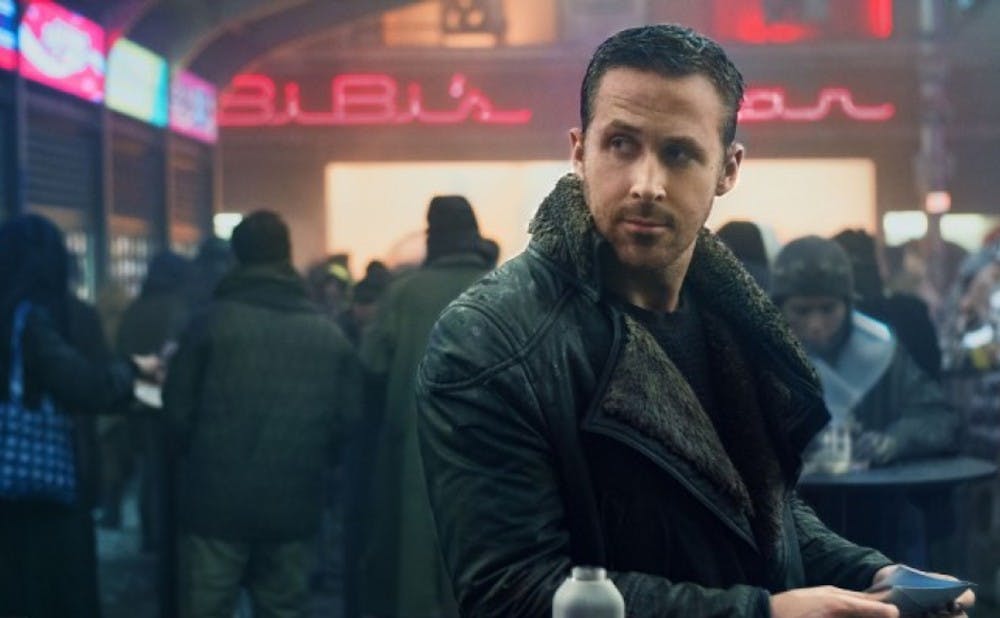“Blade Runner 2049” has arguably induced the most skepticism of any film in 2017. The original “Blade Runner,” released in 1982, spent over 30 years amassing a cult following. A sequel threatened to tarnish not only the reputation of the original, but the loyalty of its following; the sequel’s potential mishaps and redundancies could eclipse the previous film's impact. With “Blade Runner 2049” being such a fragile venture, one may wonder the point in revisiting a film that most prefer be left alone. “2049” director Denis Villeneuve was forced to deal with that exact question, remarking that “every single fan will walk into the theater with a baseball bat.” Only with his determined mindset — that “art is risk” — could Villeneuve create the masterpiece he did, one that manages to, in an environment so foreign and unimaginable, deliver a message that could not hit closer to home.
The sequel takes place 30 years after its predecessor. In that time, visionary Niander Wallace (Jared Leto) has adopted the sinking Tyrell corporation and developed a more obedient replicant model. One of these replicants is Officer K (Ryan Gosling), a member of the LAPD tasked with retiring older replicant models. As a groundbreaking case develops, K, commanded by the domineering Lieutenant Joshi (Robin Wright), must hunt down the original blade runner Rick Deckard (Harrison Ford, reprising his previous role) and keep Wallace and his replicant henchwoman Luv (Sylvia Hoeks) off his tail.
“Blade Runner 2049” is neither a direct continuation nor a complete reimagination of “Blade Runner.” It uses the 2007 final cut version for its canon, which accounts for the lack of narration and the emphasis on ambiguity. Despite any differences between the two films, the heavy social commentary and elusiveness of the first film live on. The runtime of two hours and 43 minutes is an understandable red flag for the average moviegoer. However, the tripartite film plays out like clockwork, effortlessly blending suspense, art and thought in a way that fully justifies its length.
Cinematographer Roger Deakins, who previously worked with Villeneuve on “Sicario” and “Prisoners,” creates a seminal piece of work. Sweeping shots of the crowded, grim Los Angeles show a place that is somehow both dead and alive. Technically stunning hologram advertisements overrun the city and cop cars fly overhead. In a stark contrast, Wallace headquarters presents an unsettling facade of tranquility and modernity, which most accurately resembles the alien, decrepit remains of Las Vegas that serve as Deckard’s hideout. Music by Hans Zimmer and Benjamin Wallfisch, who recently crafted the suspenseful score for “Dunkirk,” layer the setting with alternating periods of intense sound and chilling silence. This music strays from the jazz prevalent in the original, which gives “Blade Runner 2049” a distinctly obsolete, otherworldly feeling.
This bleak tone is made more personal through Ryan Gosling’s performance. Gosling often plays the tough, misunderstood sensitive; with 2011’s “Drive,” he became known for it. Officer K is a tricky character to capture. He is a replicant, but he strives to understand what it means to be human. K is a man of few words, so his internal struggle can easily be forgotten. Gosling grounds the film in his subtle emotion, giving the viewer an opportunity to empathize with his character.
Impressive performances all the way down the cast list strengthen the connection between the years 2017 and 2049. Harrison Ford reprises his role as Rick Deckard and, despite showing up nearly two hours into the film, he finds time to remind skeptics of the complexity and compassion that made his original performance so special. Newcomer Sylvia Hoeks is wonderfully frightening as Luv, Wallace’s evil assistant. Equal parts suave and crazed, Hoeks outshines Leto’s satisfactory portrayal of demented businessman Niander Wallace. Robin Wright works well as the powerful Lieutenant Joshi; her scenes with K serve as an important catalyst for K’s internal crisis. Even Dave Bautista of “Guardians of the Galaxy” and Barkhad Abdi of “Captain Phillips” make the most of their limited screen time.
“Blade Runner 2049” asks us what it means to be human. Replicants are famously advertised as more human than actual humans, yet they fail to gain equal treatment. The film intentionally makes it difficult to decipher whether anyone is replicant or human. In his character arc, K must decide what it means to be human, and whether his existence as a replicant is a handicap. Does being born make you human? Does being human make you better? Do origins or actions make a person? These questions make up the heart of “Blade Runner 2049,” and their eternal relevance is sure to resonate with audiences.
Unfortunately, “Blade Runner 2049” has been an early box office flop, which confirms predictions that the film is destined to match the financial success of its predecessor. Runtime, rating and false blockbuster advertising all contribute to the failure. The film ends so precariously, so perfectly, that the mere mention of a follow-up could upset the balance. Even the people who thoroughly enjoyed both “Blade Runner” and “Blade Runner 2049” are not likely to want another film. For the best chance of creating a future classic, maybe Scott should wait 35 years to revisit, considering it worked the first time.
Get The Chronicle straight to your inbox
Signup for our weekly newsletter. Cancel at any time.

